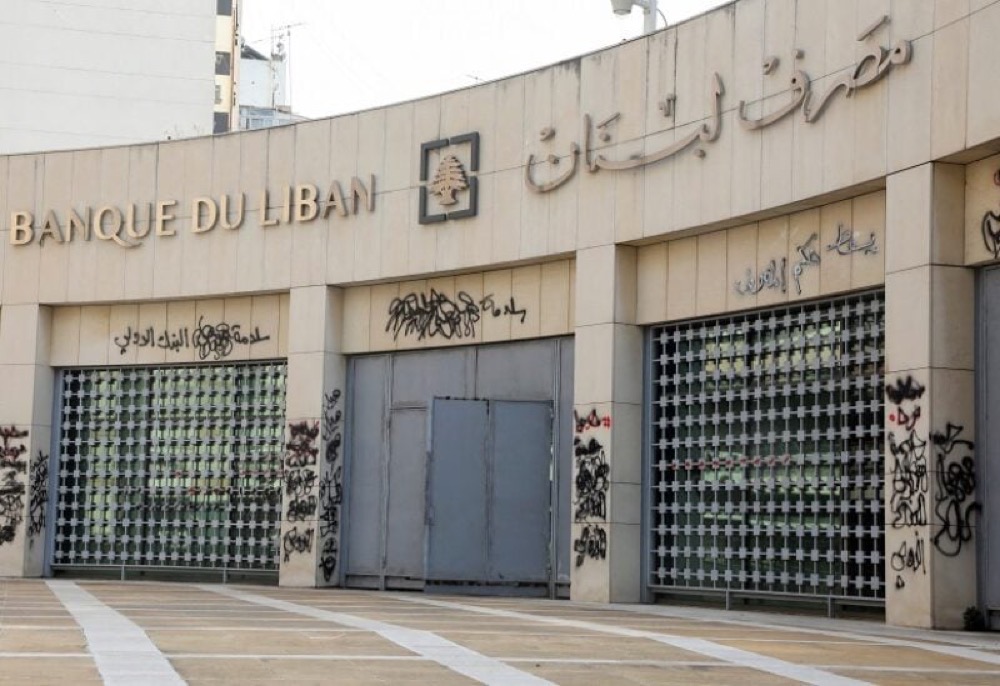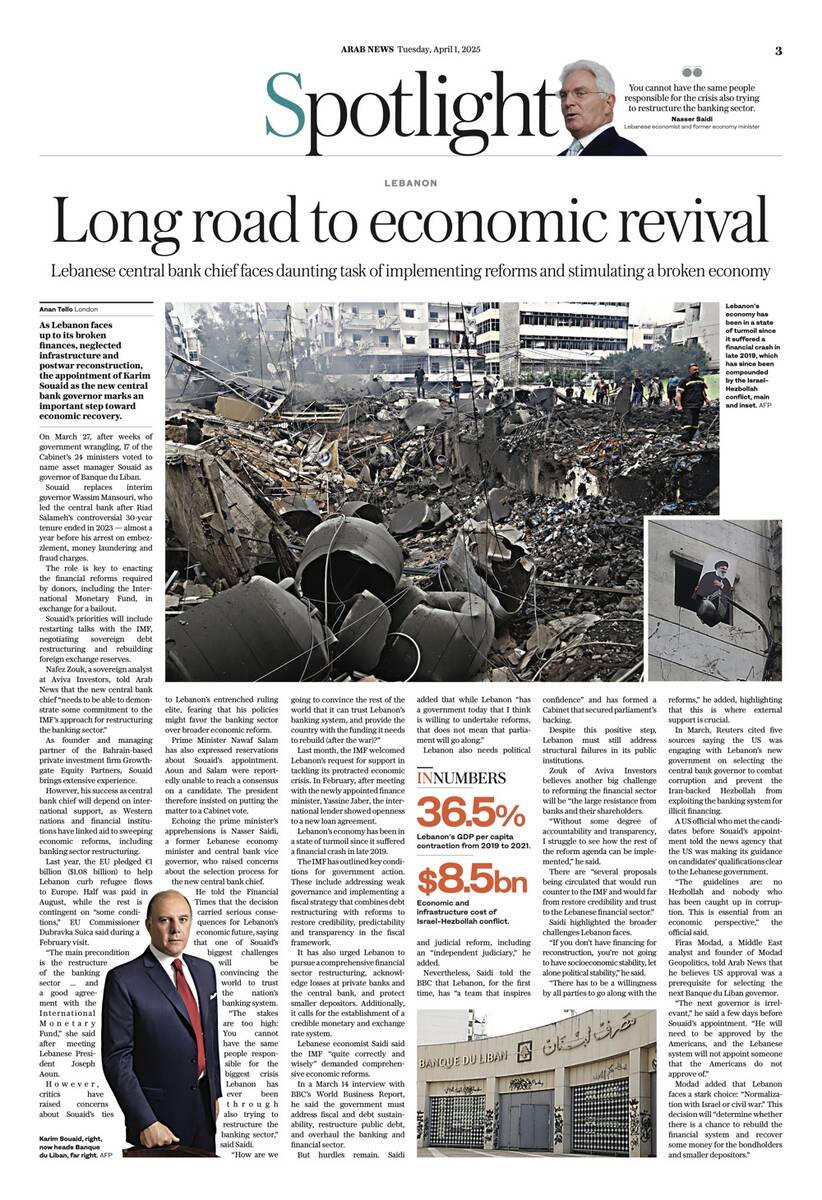BEIRUT: Najib Mikati, the caretaker prime minister of Lebanon, condemned two Israeli airstrikes on the city of Nabatieh on Tuesday evening.
The attacks resulted in 20 injuries in the strike on Nabatieh Al-Fawqa and 10 injuries from the attack on the Zawtar-Nabatieh Al-Fawqa road, according to the Lebanese Ministry of Health.
The two attacks were the first acts of aggression since the ceasefire came into effect on Nov. 27. The ceasefire was extended, at Israel’s request and with the approval of the US, until Feb. 18.
Mikati said the aggression was “an additional violation of Lebanese sovereignty and a blatant breach of the ceasefire arrangements and the provisions of Resolution 1701.”
He contacted the American head of the five-member committee responsible for overseeing the implementation of the ceasefire agreement, Gen. Jasper Jeffers, urging him to adopt a “firm stance to ensure that Israel fulfills its obligations under international law.”
Since Sunday, residents of border areas have been returning to their towns ahead of the extension of the Israeli withdrawal deadline.
But Israeli forces that infiltrated the region responded by firing shots and using smoke and sound bombs, resulting in dozens of casualties and injuries.
The Israeli army said that it was “redeploying its forces to sites in southern Lebanon to enable the gradual effective deployment of the Lebanese army and to remove Hezbollah.”
The Israeli army said that the two airstrikes on Tuesday night in Nabatieh and its surroundings targeted “a truck and a vehicle belonging to Hezbollah that were transporting weapons in the areas of Shaqif and Nabatieh. The aim of the two raids was to remove a threat. The truck and the vehicle were targeted after the Israeli army monitored them while they were transporting weapons.”
The Israeli army in a statement said that it is “determined to operate in accordance with the agreements between Israel and Lebanon, despite Hezbollah’s attempts to re-enter southern Lebanon” and that it “will take action to eliminate any threats to Israel and its citizens.”
Ori Gordin, commander of the Northern Command in Israel, said: “Hezbollah has been defeated, and if it tries to respond, we will eliminate it and its leadership.”
On Wednesday, Israeli incursions into Lebanese airspace and southern villages continued to prevent civilians from returning to their towns.
Israeli army tanks tried to advance into the Mfailha area west of the town of Mays Al-Jabal, where Lebanese army vehicles and personnel confronted them.
The National News Agency reported that “Israeli enemy forces advanced to a distance of 100 meters from the Lebanese army’s position at the western entrance of Mays Al-Jabal” and that “a bulldozer cleared and raised barriers in the middle of the road after passing UNIFIL’s post, under the protection of a Merkava tank firing ahead of it.”
The Israeli army captured four citizens, including a woman, who were inspecting their home on the outskirts of the town of Maroun Al-Ras. It also opened fire on two other individuals, wounding them as they tried to advance in the town.
Israeli forces detained an ambulance in Maroun Al-Ras that was trying to transport the wounded. The Israeli army later released three of the four captured citizens.
An Israeli drone tried to obstruct the return of residents along the Shaqra-Majdal Selm-Hula road by dropping stun grenades on a gathering, injuring five civilians, while on the Taybeh-Qantara road, an Israeli vehicle fired shots into the air to intimidate residents.
On social media, videos showed Lebanese army personnel touring tunnels south of the Litani River that they had taken over from Hezbollah. The tunnels contained several trucks and manufacturing equipment, but no weapons.
The Lebanese military confirmed that “army units have moved into border areas south of the Litani following the withdrawal of the Israeli enemy, in coordination with the Quintet Committee overseeing the ceasefire agreement.”
The ceasefire agreement calls for “the dismantling of all military infrastructure and sites, as well as the confiscation of all unauthorized weapons that contradict these commitments, starting from the area south of the Litani.”
Meanwhile, the Israeli army continued its scorched-earth strategy by demolishing buildings in the town of Kfarkela and bulldozing homes, ancient trees, and infrastructure in Hula, Mays Al-Jabal, and Markaba.
Residents of Kfarkela set up a tent on the Khardali road at the Deir Mimas-Qlaiaa junction, announcing that they plan to stay there until the Israeli army leaves the area, allowing their return.
Lebanon’s Ministry of Health said Israeli attacks on civilians trying to enter Yaroun resulted in six injuries.
Mohammad Raad, head of Hezbollah’s parliamentary bloc, said: “The right of our people in Lebanon to confront the occupation and its attacks is a legitimate right that they can exercise at the time and place they deem appropriate.
“The chronic international disregard to Israel’s transgressions and persistence in aggression has led it to act with hostility, disregarding all laws.”
Meanwhile, member of the Kataeb parliamentary bloc, Salim Al-Sayegh, said: “The Israeli airstrike on Nabatieh indicates that the war with Lebanon has not ended; it remains an open war.
“If this truce collapses, we must face its consequences with both bitterness and realism. We have already started dealing with its consequences today, yesterday and possibly tomorrow.”
Al-Sayegh called for “a precise reading of the situation, as there is an attempt to drag Lebanon into an arena for conflict in light of the existing balance of power.
“I fear that this could turn into another round of violence that starts in the south, leading to chaos across Lebanon.”
He emphasized the need to deploy the Lebanese army and establish its authority in disputed areas, before resorting to resistance if the agreement is breached.



































